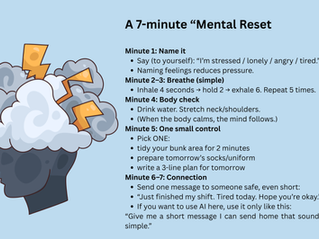`Improving Soft Skills as a Seafarer
- IMEQ CENTER

- Jun 10, 2024
- 5 min read

As a seafarer, your job demands a high level of technical expertise and physical endurance. However, soft skills—often overlooked—are equally crucial in ensuring a smooth and efficient operation on board. Soft skills, which include communication, teamwork, problem-solving, and emotional intelligence, are essential for fostering a productive and harmonious work environment. As a psychologist with extensive knowledge in this field, I aim to provide practical examples on how to identify, assess, and improve your soft skills.
Identifying Personal Soft Skills
To begin with, it's important to understand what soft skills are. Soft skills refer to a set of non-technical abilities that relate to how you work and interact with others. For seafarers, key soft skills include:
Communication: Clear and effective exchange of information.
Teamwork: Ability to work well with others towards a common goal.
Problem-Solving: Identifying solutions in challenging situations.
Adaptability: Flexibility in adapting to new conditions or changes.
Emotional Intelligence: Managing your emotions and understanding others' emotions.
Practical Example: Self-Reflection
To identify your soft skills, start with self-reflection. Reflect on past experiences and ask yourself:
How did I handle a difficult situation with a colleague?
When was the last time I needed to adapt to a new situation quickly?
How do I usually respond to feedback?
Assessing Soft Skills
Once you've identified your soft skills, the next step is to assess them. Self-assessment tools and feedback from peers and supervisors can be very helpful.
Self-Assessment Tools
There are several online self-assessment tools designed to evaluate soft skills. Tools like the Emotional Intelligence Appraisal or the DISC Personality Test can provide insights into your strengths and areas for improvement.
Practical Example: Peer Feedback
Engage in a 360-degree feedback process where you gather feedback from your peers, subordinates, and supervisors. Ask for specific examples of your behavior in various situations to understand how others perceive your soft skills.
Improving Soft Skills
Improving soft skills requires ongoing effort and practice. Here are practical steps to enhance your soft skills:
Communication
Active Listening: Practice active listening by fully concentrating, understanding, and responding thoughtfully to your colleagues.
Clear Messaging: Be clear and concise in your communication. Avoid jargon and ensure your message is understood.
Teamwork
Collaboration: Engage in team activities and take the initiative to contribute to group tasks.
Support: Offer help and support to your colleagues when needed.
Problem-Solving
Critical Thinking: Practice critical thinking by analyzing situations thoroughly before making decisions.
Creativity: Encourage brainstorming sessions to come up with innovative solutions to problems.
Adaptability
Flexibility: Be open to new ideas and willing to change your approach based on new information.
Learning: Continuously seek out learning opportunities to stay updated with the latest industry trends and practices.
Emotional Intelligence
Self-Awareness: Practice mindfulness and self-reflection to understand your emotions and reactions.
Empathy: Develop empathy by actively trying to understand and share the feelings of others.
Research Data on Soft Skills
Research shows that soft skills are critical for career success, especially in demanding environments like seafaring. According to a study by the Stanford Research Institute International and the Carnegie Mellon Foundation, 75% of long-term job success depends on people skills, while only 25% on technical knowledge. Moreover, a report by Deloitte highlights that soft skills, including communication and emotional intelligence, are crucial for leadership and effective teamwork in high-pressure situations like those encountered at sea.
REAL LIFE SCENARIOS
Scenario 1: Effective Communication During a Crisis
Situation
During a storm, the ship encounters mechanical failure, and immediate action is required to ensure safety.
Practicing Communication
Clear Instructions: As the officer in charge, you must clearly communicate the situation to the crew. Use short, direct sentences to convey the urgency and specific tasks each crew member needs to undertake.
Active Listening: Listen to the feedback from the engineering team about the status of repairs. Ensure they feel heard and understood, which will help in making quick and effective decisions.
Non-Verbal Communication: Use hand signals and gestures to communicate over the noise of the storm. Maintain eye contact to ensure your instructions are understood.
Outcome
Effective communication ensures that everyone knows their role, tasks are executed efficiently, and the ship's safety is maintained.
Scenario 2: Teamwork During a Rescue Operation
Situation
A nearby vessel has sent out a distress signal, and your ship is the closest responder.
Practicing Teamwork
Role Allocation: Assign specific roles based on the strengths and skills of your crew members. For instance, the strongest swimmers handle the water rescue, while the medical team prepares to receive and treat survivors.
Collaboration: Work closely with the bridge team to coordinate the ship's position and movements. Ensure all team members are aware of the plan and their part in it.
Support and Trust: Foster a supportive atmosphere where crew members trust each other's abilities. Encourage them to communicate openly and offer help as needed.
Outcome
A well-coordinated team can efficiently carry out the rescue operation, ensuring the safety of the distressed vessel's crew.
Scenario 3: Problem-Solving During Equipment Failure
Situation
The ship's navigation system fails, and you need to find an alternative way to navigate to the nearest port.
Practicing Problem-Solving
Critical Thinking: Gather the navigation team to brainstorm alternative navigation methods. Consider using traditional tools like charts and compasses.
Decision Making: Evaluate the options and decide on the best course of action quickly and confidently.
Innovation: Think creatively about using available resources, such as satellite phones or contacting other ships for assistance.
Outcome
By effectively solving the problem, the ship can continue its journey safely without modern navigation aids.
Scenario 4: Adaptability During an Unexpected Port Change
Situation
Due to political unrest, the ship must divert to a different port than originally planned.
Practicing Adaptability
Flexibility: Quickly adjust to the new plan. Inform the crew about the change and the new destination.
Resourcefulness: Assess the new port's facilities and requirements. Ensure all necessary documentation and permissions are arranged.
Learning: Take this opportunity to learn about the new port's regulations and procedures, enhancing your knowledge for future missions.
Outcome
Adaptability allows the crew to handle the unexpected change smoothly, minimizing disruptions and maintaining operational efficiency.
Scenario 5: Emotional Intelligence During Crew Conflict
Situation
A conflict arises between two crew members, affecting their performance and the overall morale on board.
Practicing Emotional Intelligence
Self-Awareness: Recognize your own emotions and stay calm and composed when addressing the conflict.
Empathy: Listen to both parties involved in the conflict. Try to understand their perspectives and feelings without judgment.
Conflict Resolution: Facilitate a discussion where both parties can express their concerns. Help them find common ground and agree on a resolution.
Outcome
Using emotional intelligence to resolve conflicts helps maintain a positive and collaborative environment on board.
SO...
These practical scenarios illustrate how soft skills can be applied in real-life situations on board a ship. By practicing communication, teamwork, problem-solving, adaptability, and emotional intelligence, seafarers can enhance their performance and contribute to a safer and more efficient maritime operation. Regularly engaging in these scenarios will help you develop and strengthen your soft skills, making you a more effective and valuable member of the crew.





































































































Brilliant and simple solutions.
Identifying solutions in challenging situations
Its good to have this idea in mind